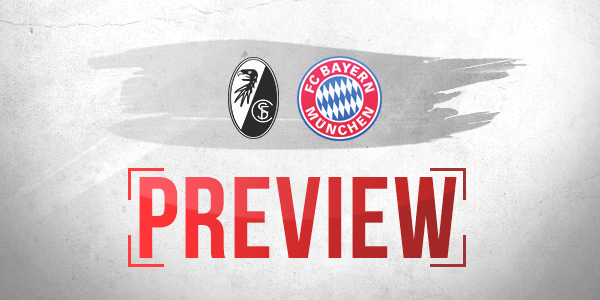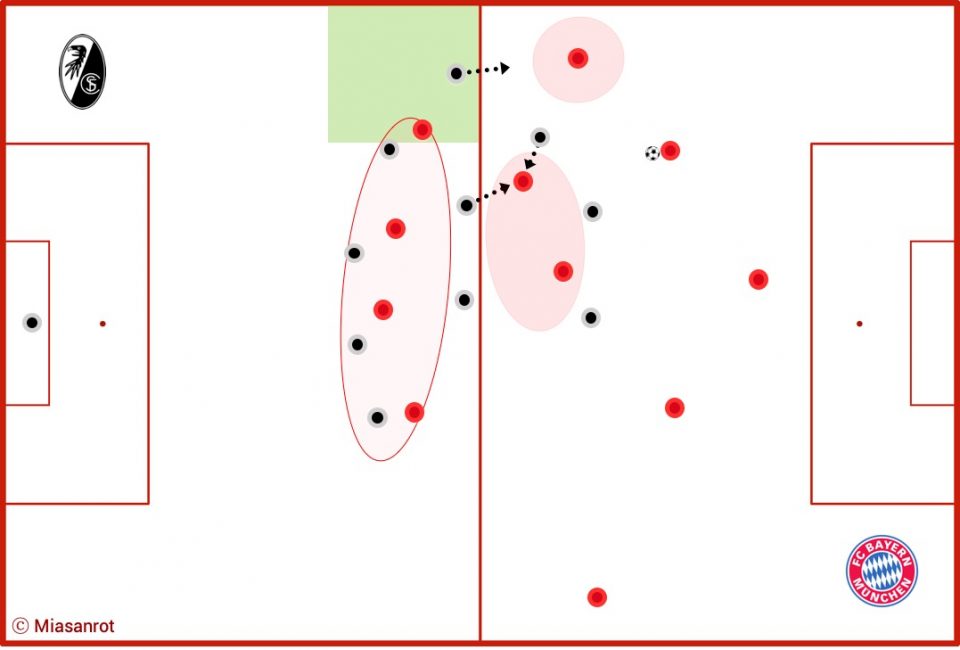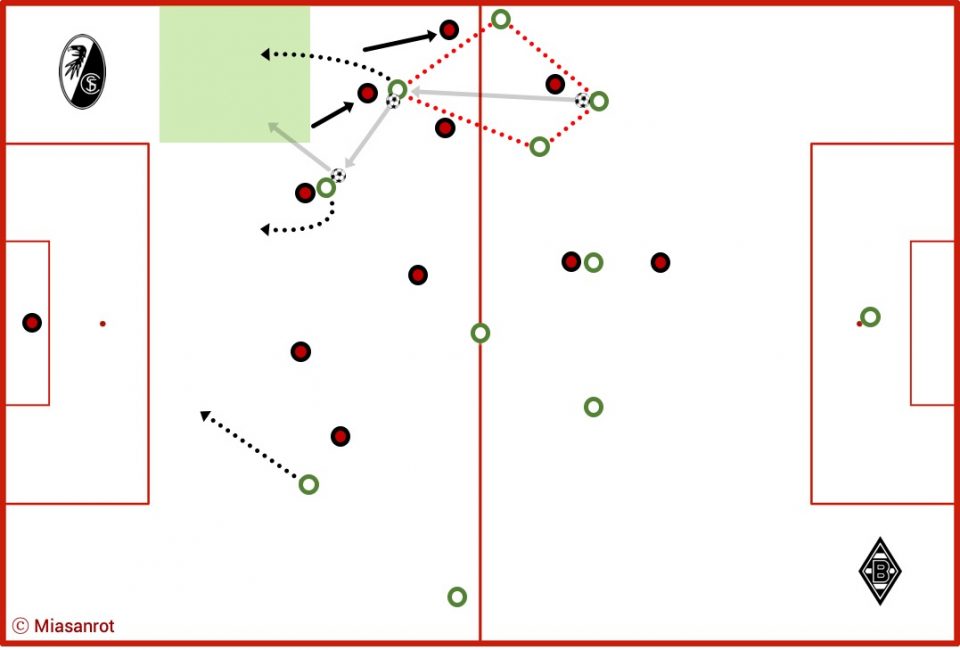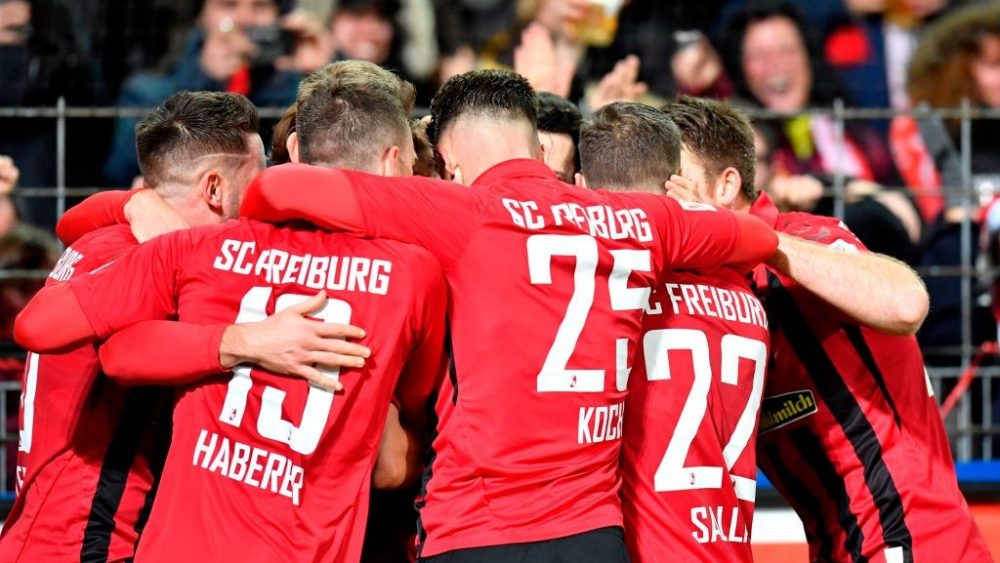Bundesliga MD 16 preview: Freiburg against Bayern
“I am very disappointed”, Christian Streich said on Saturday after his team’s 0-1 defeat at the hand of Hertha BSC. Freiburg had a tremendous start to the season with five wins, two draws, and two defeats in the first nine games, but has not been able to keep up this level since. They achieved only two wins in their last seven games, both of which were narrow 1-0 victories against Frankfurt and Wolfsburg.
And yet, Streich takes a positive overall view on the match against Hertha: “A lot of teams find it hard to create chances against such a deep opponent”, the “Kicker” quotes him as saying. “We sometimes do too. That’s why we’re Freiburg and not Barcelona.”
Captain Christian Günter struck the same note, saying his team had to take the next step and develop a greater goal threat in possession in the final third. There is a healthy degree of self-criticism at Freiburg, but on the whole, everybody is rightfully delighted with their momentary sixth place in the table.

Freiburg: Strengths and weaknesses
Freiburg’s positive mood does not have to end with the game against Bayern. Streich’s record against Bayern is decent. At home especially, Freiburg has been able to lay down a marker on occasion with him at the helm. In seven games away to Streich’s Freiburg, Bayern has only managed three wins, the most comprehensive of which was a 0-4 in the 2017/18 season. The other two times were decidedly more narrow: 1-2 in 2017 and 0-2 in 2012.
There were three draws, which a came in 2012 (0-0), 2013 (1-1), and in March of 2019 (1-1). Only in 2015, Streich’s side managed to get a victory when Bayern was already crowned champios. To cut a long story short: It would not been a huge surprise if Freiburg were able to snatch a point or three from their Bavarian counterparts on Wednesday night.
This is in part due to the fact that Freiburg are comfortable being the underdog. 2-2 against Dortmund, a 2-1 win against RB Leipzig, a 1-1 draw away at Leverkusen – apart from the 4-2 defeat against Gladbach, Freiburg has a very presentable record against teams from the upper half of the table. On the other hand, the record shows defeats against Cologne, Union (league and cup), and Hertha – teams from the bottom half of the table one and all.
Weaknesses in the final third
The reason is simple: at only 17.5 expected goals (xG), Freiburg are joint 13th along with Mainz. During the last weeks especially they did not manage to create enough clear-cut chances. 0.96 xG on average is the meager return in the last five matches.
Chance creation has recently been a problem in general. 12.7 shots per game put them in 11th place in this category; their record of 3.9 shots on target at 15th is even worse. Freiburg’s issues in attack are also evident in the figure that merely 26% of their touches take place in the final third. This is the third worst figure in the league (alongside Dusseldorf and Augsburg). Bayern, by contrast, have a record of 33%.
So as many statistics show, Freiburg is a lower mid-range club without their strong table position necessarily having to be an aberration. With 24 goals scored, Freiburg has the sixth highest figure in the league. Although they greatly outperform their xG rate with this, it shows that they are very efficient at converting their chances.
Strengths in defense
Streich can be very satisfied with his team’s work against the ball at present. Freiburg’s standout strength is their intensity. The team does not just run a lot (16.28 km per game; place 9), there is a purpose to their running. Moreover, their compactness is a major reason why they have not yet conceded more than 18 goals so far this season – three fewer than Bayern. On their very tight pitch (which is shorter than official regulations allow, which required a special permission of the DFB), they are very skilled at shifting along with the ball when the play is switched across.
24.4 xG against is also a bottom third value in the league, but the number is slightly deceiving as the games against Leverkusen (3.7), Gladbach (4.5) and Leipzig (2.1) already make up 10.3 xG against of that total. Their average of 1.18 xG against in all remaining games is an impressive figure.
Bayern would be well advised to analyze the three games where Freiburg’s xG against was well above this average, because this could be very insightful as to the holes in Freiburg’s most common patterns of play that Bayern could exploit.
This is what Bayern should expect
In all three games, Freiburg predominantly played with a back three. This is Christian Streich’s preferred system. Within a game, however, the team is very flexible. For example, they sometimes change to 4-4-2 to have different angles in closing down their opponents.
Even in the three games mentioned above, there were phases in which Streich’s side played highly organised and aggressively against the ball. But also in possession they have their strengths, although the final touch in the final third is often missing. So Freiburg are good at drawing out the opponent and overplaying them – if necessary by a long ball over the top in combination with pushing up quickly to attack the second ball.
Especially against Bayern this might be one of the preferred ways. Bayern still have problems in positioning their full-backs on the wings. It would therefore only be logical for Freiburg to try to provoke Bayern’s defense to commit to a high pressing and then outplay them by a long ball or via an open player through the half-spaces. Bayern’s task is therefore to either immediately put high pressure on the player in possession or to swiftly shift in midfield so that both the long balls over the top and the diagonal short passes are not successful.
Learn from Gladbach
If Bayern are in possession, Freiburg’s wings are a possible weak point to exploit, but not by playing the ball across to the full-backs and then straight upfield to the wingers.

Rather it will be a matter of provoking the full-back to press and so force their teammates to make a decision. In the graphic, four Bayern players tie up the entire defense, while two midfielders position themselves in the space between the lines in such a way that the surrounding opponents have to make the decision: Either they open a diagonal route to the center for Bayern or to accept that their full-backs take Bayern’s wingers on one-on-one.
With appropriate support, Bayern could succeed in playing diagonally through the spaces between Freiburg’s lines. Gladbach, in particular, showed how to do that several times in the 4-2 victory over the team from the Black Forest.

In the scene reconstructed here from the 30th minute of the game, Gladbach gets in behind the Freiburg back line. Due to an overload on the right side, Freiburg’s defense is forced to exert pressure.
Since Gladbach are well positioned, however, their initial vertical pass up to the winger is successful, who cuts the ball back directly in between the lines to the waiting striker who puts it back to the initial player, who immediately goes deep. With a lot of speed and a few contacts Gladbach managed to create a big chance.
Freiburg is not Barcelona, but just as unpleasant
Bayern are also capable of such attacks, but their default positioning is usually higher up the pitch than Gladbach’s in this scene. Compared to the first half against Bremen, Flick has to take care that there are enough offensive players to force Freiburg into such situations.
On the other hand, it will be important to provide a defensive backup for potential turnovers. Flick stated at the press conference: “Everyone participates in our defensive work. When you have so much ball possession, the point is that the remaining defenders are well positioned.” It would be important to switch more quickly and mark the opponents better in order to have more control.
Freiburg is a team that is always able to conjure up a moment of surprise out of the blue because of its flexibility and joy of playing. It will be all the more important for Bayern not to let them have the ball for too long. The longer Freiburg is forced to run and work of the ball, the more susceptible they are to successively lose their shape. Freiburg is not Barcelona after all. But they are still a team that can annoy teams like Bayern on a good day. Ultimately, much will depend on how much Bayern allow that to happen.





